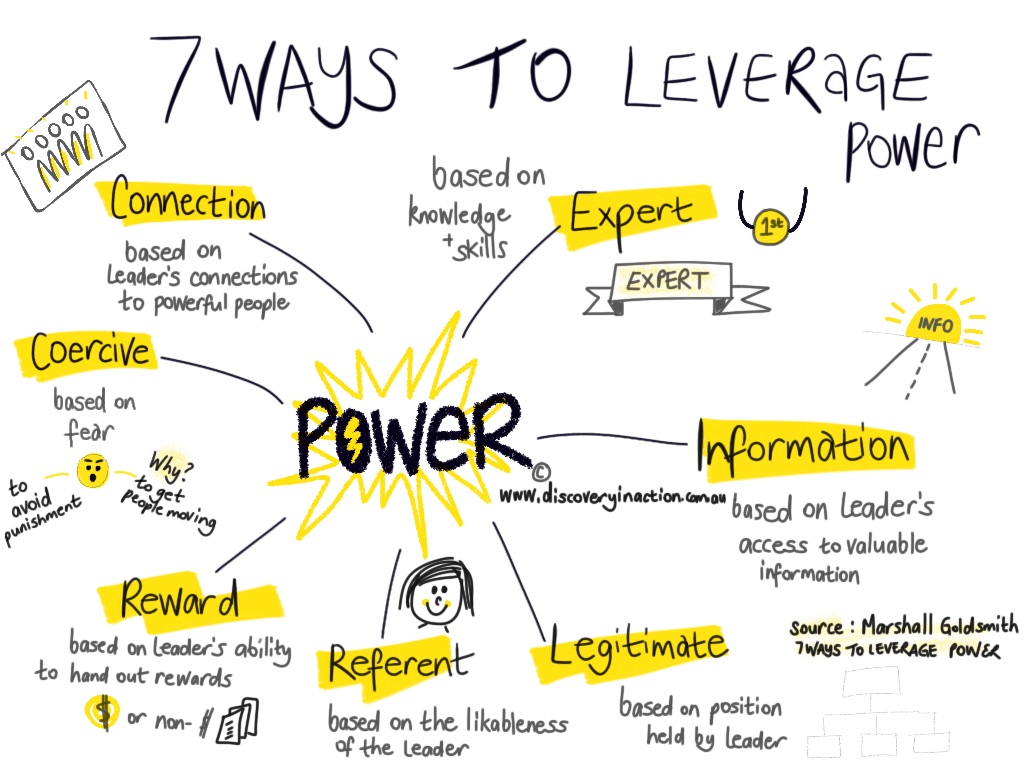Developing your power and influence
During our Discovery in Action sessions the issue of power and influence often emerges during discussions. This can be in the context of leading staff, managing up or influencing and leading peers and stakeholders inside or outside the organisation. An interesting question we sometimes explore, especially when people feel they don’t have a great deal of power, is: Where does your power come from? This often elicits a deeper understanding of how you can become more influential by drawing on a range of ‘power bases’ that don’t necessarily derive from organisational position or authority.
We were excited when we recently come across a Marshall Goldsmith video and blog that describes a simple model on the seven bases of power. These seven bases of power are described as:
- Coercive – based on fear
- Connection – based on the leader’s connections to powerful individuals
- Expert – based on knowledge and skill of the leader
- Information – based on the leader’s access to valuable information
- Legitimate – based on the position held by the leader
- Referent – based on the likableness of the leader
- Reward – based on the leader’s ability to hand out rewards, both, monetary and non-monetary
We have captured these in this simple info-visual – 7 ways to leverage power.
What is particularly interesting, as discussed in the short video, is that the most effective 3 power bases are identified as Legitimate, Referent and Expert. Now the first of these is relatively obvious i.e. positional power. However the other two are particularly important when exploring influence where you may have very limited positional power but you need to get things done with and through others. These two power bases of Referent and Expert are highly consistent with a well-known article published by Jay Conger in the Harvard Business Review entitled the The Art of Persuasion (HBR May-June 1998) where he discussed two critical ‘credibilities’ of effective persuaders:
- Their relationship credibility – the extent to which people like and respect you (akin to the Referent power base); and
- Their expertise credibility – the extent to which people think you know what you are talking about (akin to the Expert power base)
It is also consistent with the work of Robert Cialdini in his seminal 1984 book Influence: the Psychology of Persuasion where he identifies authority and liking as two (of 6) critical influence patterns. (click here to see a post on these persuasion principles.)
So, as per most things in leadership and management, there is not much that is new under the sun. However it is a simple and powerful reminder that if you want to be influential it is important to build your expertise and relationship credibility. So in simple terms, if you want to be influential (without positional power):
- Know your stuff. Invest in being highly knowledgeable and skilled in the topics around which you are wanting to influence. In an organisational setting it could be about making regular presentations, running training sessions, writing internal blogs or pieces for the organisational newsletter. Or you could do these things on a broader stage if your are seeking to influence outside your organisation.
- Build networks and get to know people. Take the time to actively develop relationships with people you want to influence. Be friendly, have coffee catch-ups, get to know their issues and business, be helpful, follow through on promises, build trust.
Again, like most things, its not rocket science, however consistent attention and discipline over time will provide you with the leverage from these power bases that helps you to be influential.

